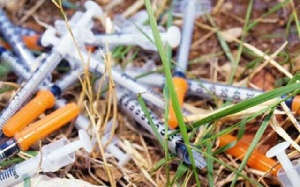Health News of Wednesday, 18 May 2016
Source: classfmonline.com
Biomedical waste disposal: IMANI raises red flags
Policy think tank IMANI Ghana has called for a legislative instrument to effectively deal with the country's biomedical waste as its latest findings point to lack of enforcement and implementation of existing policies.
Biomedical waste, which are the bandages, syringes, plasters, hypodermic needles, and other materials used in hospitals for the treatment of patients, are not disposed of the proper way, IMANI said.
The segregation, treatment, and collection, disposal, and even the transportation of these wastes are not done in a manner that guarantees public safety, as far as IMANI is concerned.
A research fellow at IMANI, Bryan Dzansi, speaking with Class News’ Ridwan Karim Dini Osman said the enforcement and implementation gap is largely to blame for the increasing rates of infections such as HIV, Hepatitis A and B, among others.
“Are you aware where the vegetables you purchase and eat are watered? ...Another example is radioactive waves. Radioactive waves are very dangerous. A little exposure and a lot die, but we found out in our research that about 50 per cent of hospitals actually just add it to the city waste and throw it away and we have scavengers and someone might even pick this home and might never know,” he said.
“We have not found any empirical quantitation of the impact [of the waste] that is why we put it from the public health angle that these things are actually happening. People are infected. HIV could be transferred or transmitted through some of these syringes, which are left on the rubbish sites. Until we are able to monitor and record that we cannot state the quantity, but the public health impact is there and we need to do something about it.”











